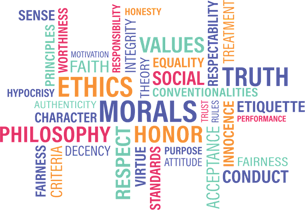 Most of us have an ambivalent attitude towards ethics, and would not see this field as something exciting or powerful. We know and feel that without a certain amount of goodness, life isn't really worth living. But on the other hand, ethics can make us think about things like right or wrong and what we should or shouldn't do. This side can be seen as a bit of a drag!
Most of us have an ambivalent attitude towards ethics, and would not see this field as something exciting or powerful. We know and feel that without a certain amount of goodness, life isn't really worth living. But on the other hand, ethics can make us think about things like right or wrong and what we should or shouldn't do. This side can be seen as a bit of a drag!
We actuaries may ask ourselves the purpose behind the recent increase in regulatory requirements for professionals to get Continuing Professional Development in ethics. A pessimistic perspective might see the world as a brutal place, with ethics a luxury good, and others may see ethics courses as simple boxes to check that don’t generate any real change.
Reality, however, is different. Classical ethics was created to teach us how to do great deeds, achieve great things, live a great life, have a great career, and in ancient times, how to be a great Roman emperor. Ethics is exciting!
Even the most privileged amongst us have been educated to only a small fraction of our potential. Most of us have achieved our successes mostly through our drive and through our own self-education – and luckier ones with help and support from other. In antiquity there were two types of education systems—one for the citizens (politēs) and one for the non-citizens (doulos). Politēs were taught all noble and goodly things that would tend to make them strong, proud and courageous; from the Doulos all such dangerous knowledge was hidden. They were taught not to be strong, proud and courageous, but to be sleek, obsequious and dexterous: the object was not to make them good citizens, but to make them good subordinates. The reality is that we mostly only have one system today and it's based on the latter rather than the former. The more powerful education system for the politēs is no longer part of the education narrative in any meaningful sense.
Classical ethics is the closest concept to classical education. A classical education was primarily based on the principle “Know Yourself.” To “Know Yourself” is to know yourself in the context of being human—to be able to see the heights to which you can soar, and the depths to which you can fall—and to help you to thrive and not fall into life’s traps. It enables us to align perceptions with reality. Too many of us don’t know the perceptions that help us most, and those that hurt us most.
Unlike modern education, which focuses on the brain, classical education focuses mainly on our gut and heart—starting the fire in our bellies and instilling freedom in our hearts. Failure to know yourself was traditionally considered problematic and dangerous. If we don't know ourselves we can't govern ourselves—if we can’t govern ourselves we’re ruled by our ego and by others. If we can’t govern ourselves and lead ourselves, how can we lead others?
So what! What does knowing this do for me? It does nothing for you unless you know how to know yourself and you take actions to do so!
If you are interested in learning more about how to apply this in your life, including practical examples for actuaries and professionals, join me in one of my webinars “The Power of Ethics for Professionals” on January 30th or “Ethical Leadership for Professionals” on March 27th.
Colm Fitzgerald, BAFS, MA, FSAI, FIA
Colm is the Director of the Actuarial & Financial Studies program in University College Dublin (UCD). Before academia he had a successful career in financial markets, where he was Head of Quantitative Trading in Bank of Ireland Global Markets. He is an active volunteer in the actuarial profession. He is a member of Education Board and the Board of Examiners in the Institute & Faculty of Actuaries amongst other roles. In UCD, he teaches classical ethics, workplace skills, actuarial risk management, investment psychology and trading, economics and finance.

